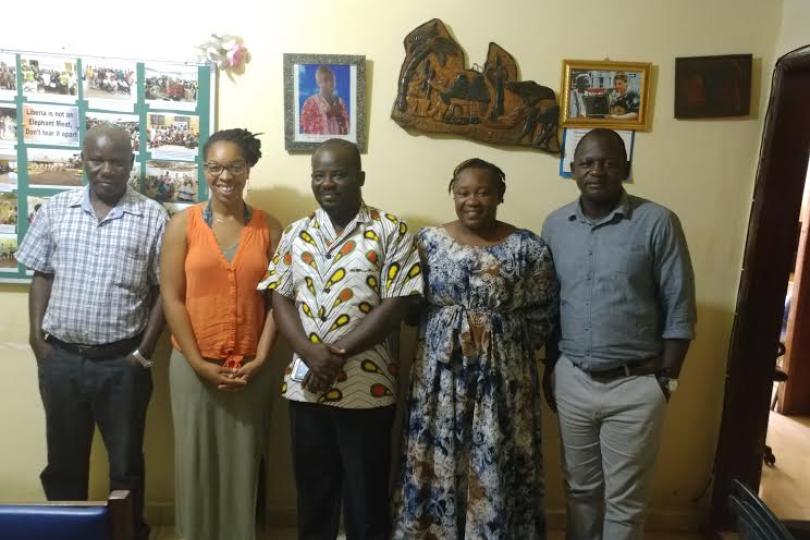Creating Specactors

This past July I had the wonderful opportunity to travel to Monrovia Liberia, a country in west Africa inhabited by indigenous tribes like Bassa and Krahn, as well as by descendents of freed African Slaves from the Americas. I was there to teach Social Justice Theatre to youth living in Chocolate City, ( a “borough” named for its bright chocolate colored mud). My time there was cherishable. I got to pursue my passion as well as learn from people most would think cannot escape the unimaginable.
But those living in Liberia today actually have “escaped the unimaginable”. The country is filled with survivors, go-getters, and the most hospitable people I have ever met. Fresh from a decade long civil war that tore apart families and civilization as they knew it, I saw that those who still reside in their motherland have a graceful resiliency and a drive to make Liberia the haven it once was. I learned that like most countries, if not all, Liberians want change for the place they call home.
One effort being taken to spark change in Liberia is through Flomo Theatre, a company that sparked in 1980, after a bloody Coup d'etat and before the first civil war of 1989. For the past 38 years Flomo has been a giant part of the peacekeeping efforts that has kept Liberia together. I sat down with the Director, Alex Swaray, to ask about the history, current efforts and future outlook of Flomo as it is nearing its 40th anniversary. He and the rest of the team (insightful, courageous and humble) gave me a crash course in Liberian history and the rise of Flomo Theatre.
I hope that by spotlighting this amazing company I can inspire theatre makers and patrons to expand their minds on what theatre can do. It can heal, save lives, and be used as a tool for change in our world.
The History of Flomo
A bit of history: In short, when freed African slaves from the America’s began to make the move back to Africa in 1880, it wasn’t such a heartwarming return to a homeland as some might suspect. In fact, the black settlers used many painful tactics of colonization that were learned from their european oppressors. Indigenous tribes began to be oppressed in ways that excluded them from citizenship and partaking in politics of the “new” country. Over 100 years of this oppression is what would lead to the bloody civil war.
In Mr. Swaray’s words, here is the history of Flomo Theatre;
“After the bloody coup d'etat and the overthrow of the president (William R. Tolber Jr.) there was a gross abuse of human rights, violations of cultural institutions and artifacts. The vast majority of the population was illiterate and could not understand the workings of government. A group of people, writers, policy advocates, and traditionalists came together to form Flomo Theatre as a medium to communicate with the masses of ordinary Liberians in their language and manners so that they could understand the workings of government. It shed light on some of the gross human right abuses that were being carried out on them that they took as normalcy due to the lack of understanding their rights.”
Flomo theatre was founded by Peter Y. Ballah (known as Flomo) who got an education in the United states to become an engineer. He felt that the only way to reach out to liberian people was to establish a theatre driven institution that can dramatize the policies of government and the wrongdoings that were being carried out on citizens.
Examples of some of the work done by Flomo include; campaigns against the Charles Tailor Regime (former Liberian President now imprisoned for his war crimes), anti-corruption and integrity work in schools, ebola prevention, and voter registration. Swaray stressed that most people in Liberia are illiterate (english is the national language even though there are over a dozen tribal languages, Not everyone speaks or reads english). Due to this illiteracy, it has been easier to oppress people and keep them from progress. A lot of the Ebola deaths could have been prevented if people had known proper precautions, which is why Flomo Theatre went into communities and dramatized ebola prevention tactics and methods. Swaray also stressed that voter turnout has been low especially outside of the city, so Flomo has gone to specific counties and has done political drama work that informs people on the many politicians and how they can vote. They do not publicly support specific candidates and remain politically neutral as an organization. Flomo works hard to perform in different dialects and simple english to remain inclusive. In one county, after a visit by Flomo Theatre, the voter turnout and registration was the highest its been in history.
Creating Specactors
Flomo uses the Forum Theatre approach created by Brazilian Theatre artist Augusto Boal who wanted to “give theatre back to the people” rather than perform mindless entertainment. Like Boal, the founder of Flomo Theatre was also imprisoned for his peacekeeping and justice seeking efforts. “Forum Theatre’s approach is very captivating for the population” Says Swaray. “Community becomes part of the program as specactors” rather than spectators. They are actively involved in the drama and problem solving. “We focus on what brings (community) together more than what divides them. We work with the community collectively to organize solutions adaptable to their setting so that it is inclusive. . . people are more engaged because they see that this is for them”.
Although the efforts of Flomo theatre has grown, it still strives to work at the very thing that sparked it’s birth in the 80’s; the dance between war and peace. Liberia still feels the effects and trauma of their war and Flomo Theatre actively works and advocates for ways to heal those wounds. This includes advocating for the extraction of warlords from government (people in office who committed brutal and bloody crimes during the war), dramatizing historical massacres that took place in the civil war so that citizens can currently feel those effects and understand that they should not repeat history. Swaray stressed that by doing these dramatizations, those currently in office who took part in those killings will see that citizens have not forgotten their wrongdoings. He also stressed that children growing up today in Liberia will start to see that those who did wrong in the past should not be revered even though they are now pastors, senators and other higher roles in society.
Flomo has received awards from around the world for their peace and justice efforts including the Martin Luther King Award in the United States. They are located in Monrovia Liberia and have international support from theatre and universities, even hosting internship opportunities for students. While they are currently working on their website, you can learn more through the links below!
https://www.peaceinsight.org/conflicts/liberia/peacebuilding-organisations/ftp/
https://www.facebook.com/Flomo-Theater-Production-inc-318483238224725/




